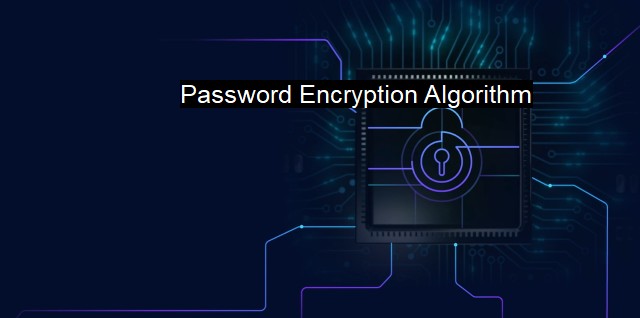What is Password Encryption Algorithm?
Unraveling the Mystery of Password Encryption Algorithms: Exploring the Fundamentals in Cybersecurity and Antivirus Contexts
Password encryption algorithms are fundamental tools in every cyber expert's portfolio, and a nonnegotiable requisite in everyday cyber security. a password encryption algorithm is a sequence of computations that transforms plaintext into ciphertext to secure information from unauthorized access. The ciphertext ideally cannot be understood, and hence, cannot be exploited by potential adversaries. These algorithms promise user data privacy and protection against cyber threats – the heart of the cybersecurity environment and antivirus programs.Delving deeper into password encryption algorithms, the conversion of readable plaintext into an unreadable ciphertext through these algorithms involves an encryption key. This key is a piece of code vital to the encryption and decoding of the message. Without this key, the cipher remains unintelligible.
Notably, there are two main types of encryption algorithms; symmetric and asymmetric algorithms. Symmetric algorithms use the same key to encrypt and decrypt a message. Asymmetric algorithms, on the other hand, use two different keys; one for encryption and the other for decryption. While symmetric encryption is faster and more efficient, asymmetric encryption is considered more secure because the decoding key is kept with the recipient only, reducing its chances of being intercepted.
Optimized to prioritize either speed or security, encryption algorithms stand as the frontline protection against unauthorized access and data breaches. Even if an attacker were to somehow gain access to encrypted data, they will not be able to interpret the contents or use it in any malicious intent without the decryption key.
Cyber security is a continual battle against time and hackers whose methods grow increasinglyintense as technology ascends. Within this security framework, antivirus programs play a major role. These programs continuously scan the system, warding off threats that could potentially exploit vulnerabilities in a computer network, system or individual devices.
Many advanced antivirus programs use password encryption algorithms to secure users' sensitive information, such as their login credentials. when you input your password, it's highly likely that the antivirus software encrypts your password by running it through a password encryption algorithm. This encrypted password then gets stored in a secure server or local vault, unavailable for cybercriminals to access.
In the ongoing attempts to intercept and prevent digital theft and phishing attempts, antivirus programs might include decryptors designed to decode the encrypted malicious code and decipher its intended course of action. Decryptors are built based on specific encryption algorithms understood by cybersecurity experts, thereby allowing them to directly confront and neutralize potential threats.
All these functionalities underscore the symbiotic relationship between encryption algorithms and antivirus programs within the field of cybersecurity. Encryption algorithms protect all forms of data, with antivirus software standing guard to ward off malware that could decipher encrypted data. it is worth noting that as algorithms evolve, so do the espionage tools and techniques of malefactors. Therefore, the pursuit of secure encryption algorithms remains perpetual.
Password encryption algorithms serve as an essential instrument within the cybersecurity sphere. These algorithms ensure safe data communication over the web, protecting users' confidential information from potential malicious actors. Integrated within antivirus software, the algorithms aid in preventing phishing or stealing data, and are integral to thwarting the onslaught of cyber-attacks and crimes that are sadly an increasing threat in our digital society. The cybersecurity world is undoubtedly complex, but platforms employing robust password encryption algorithms ensure that this complexity acts as a maze for cybercriminals rather than a straight path leading to crucial data.

Password Encryption Algorithm FAQs
What is a password encryption algorithm?
A password encryption algorithm is a mathematical function that converts a password into a more secure and unreadable format. The purpose of password encryption is to protect sensitive information, such as login credentials, from unauthorized access.Why is password encryption important in cybersecurity and antivirus?
Password encryption is crucial in cybersecurity and antivirus because it helps prevent unauthorized access to confidential information. Encrypted passwords are much harder to crack than plain text passwords, making it more challenging for hackers and cybercriminals to gain access to user accounts. Password encryption is an essential component of data protection and can help prevent identity theft, fraud, and other malicious activities.What are some commonly used password encryption algorithms?
Some commonly used password encryption algorithms include bcrypt, scrypt, PBKDF2, and SHA-256. Each of these algorithms has its strengths and weaknesses, and the choice of which one to use depends on several factors, including the level of security required, the performance of the algorithm, and the ease of implementation.Can password encryption algorithms be cracked?
While password encryption algorithms provide an extra layer of security, they are not foolproof. Advanced computer systems and hacking techniques can potentially crack password encryption algorithms, particularly if the password is weak or easily guessable. It is essential to use strong and unique passwords that are difficult to guess and avoid sharing passwords across multiple accounts. Additionally, regular updates and patches to encryption algorithms can help address vulnerabilities and strengthen security.| | A | | | B | | | C | | | D | | | E | | | F | | | G | | | H | | | I | | | J | | | K | | | L | | | M | |
| | N | | | O | | | P | | | Q | | | R | | | S | | | T | | | U | | | V | | | W | | | X | | | Y | | | Z | |
| | 1 | | | 2 | | | 3 | | | 4 | | | 7 | | | 8 | | |||||||